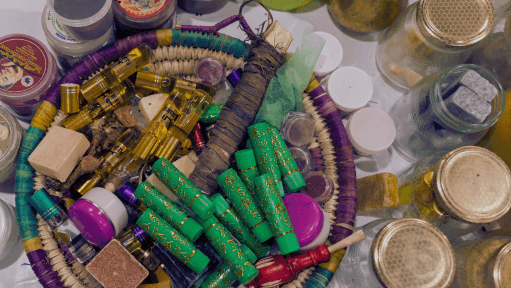
Legal Initiatives: UAE Battles Counterfeit Medical Products, Bolsters Cosmetic Regulations
The UAE has taken strong legal steps to address the problem of counterfeit medical products, including those related to cosmetics
In recent years, the UAE has taken decisive regulatory steps to confront the pervasive issue of counterfeit medical products, a threat that extends to the burgeoning cosmetic landscape.
During festive occasions, the application of traditional mehendi remains a cherished tradition. However, concerns have emerged over the increasing use of black or white henna, often laced with synthetic chemicals that can be harmful to the skin.
A prominent dermatologist has recently sounded the alarm about the risks posed by these chemicals, highlighting adverse effects on skin health. Synthetic alternatives found in black or white henna, such as PPD (paraphenylenediamine), present substantial health hazards.
Some products contain PPD levels far surpassing safe thresholds seen in hair dyes, leading to redness, swelling, blistering, painful chemical burns and scarring.
Combatting Counterfeit Medical Products
In parallel to these concerns over cosmetics, the broader issue of counterfeit medical products poses a significant risk to public safety. Consumers must remain vigilant and proactive to avoid falling victim to counterfeit medicines and devices.
Globally, counterfeit medical products are a persistent challenge, with alarming figures showing that approximately 1 in 10 medical items in low- and middle-income countries is falsified (World Health Organisation).
These misrepresented medications, intentionally mislabelled in terms of identity and origin, can have dire consequences, including treatment failure, drug resistance and fatalities.
UAE's Response
The UAE, like many nations, faces the influx of counterfeit medicines with growing apprehension. Despite robust enforcement efforts, counterfeit medications, particularly lifestyle drugs, persist in infiltrating the market, posing a grave risk to public health.
In response to this escalating threat, the UAE has intensified its efforts to combat counterfeit medical products. In recent years, enforcement agencies have tightened scrutiny of medical supplies, resulting in substantial seizures of fraudulent goods.
Collaborative operations involving law enforcement bodies such as Dubai Police and the Dubai Department of Economic Development have yielded the confiscation of millions of counterfeit medical masks, thermometers and related items.
Technological Innovations
The UAE has embraced innovative technologies and initiatives to bolster its anti-counterfeit capabilities. The Department of Health (DoH) has introduced a device capable of swiftly detecting counterfeit medicines, enhancing inspection efficiency.
Furthermore, plans for a new app to identify counterfeit medical products in the UAE market underscore the government's unwavering commitment to safeguarding public health.
Legislation in the UAE for Counterfeit Medical Products
The UAE has implemented stringent laws to deter individuals involved in the production, distribution, or sale of counterfeit medical products. The Federal Trademarks Law and Pharmacy Law impose severe penalties, including imprisonment and hefty fines, on offenders.
Under Article 37 of the Trademarks Law, penalties include imprisonment and a fine of not less than Dh5,000 for dealing with counterfeit products. Article 110 of the Pharmacy Law imposes penalties of imprisonment and/or fines ranging from Dh200,000 to Dh1,000,000 for falsifying or imitating medical products.
Cosmetic Products Regulation in the UAE
The United Arab Emirates (UAE) boasts a vibrant cosmetic industry, offering consumers a diverse range of beauty and personal care products. To ensure the safety and quality of these products, the UAE has established robust regulatory measures overseen primarily by two key administrative bodies: The Dubai Municipality (DM) and the Emirates Authority for Standardisation and Metrology (ESMA).
These organisations play a pivotal role in setting regulatory standards for cosmetic products entering the UAE market. In line with international best practices, the UAE adheres to the unified regulations for cosmetics established by the Gulf Cooperation Council (GCC).
This harmonised regulatory framework requires cosmetic products to undergo registration with both the DM and the ESMA before they can be launched in the market.
The registration process entails the submission of detailed information on the product's formulation, labelling requirements and safety assessments.
Labelling of Cosmetic Products
The labelling of cosmetic products in the UAE is meticulously regulated to ensure transparency for consumers. Labels must be presented in both Arabic and English, featuring clear instructions for use, pertinent safety warnings and other essential information.
Products containing specific substances must comply with corresponding labelling requirements.
To uphold compliance with quality standards and consumer safety, the DM and the ESMA conduct thorough testing and evaluation of cosmetic products.
The Emirates Conformity Assessment Scheme (ECAS) further certifies products that meet regulatory requirements, providing consumers with assurance of quality and safety.
The UAE has taken significant steps to address the problem of counterfeit medical products, leveraging both technological advancements and legislative measures.
The aim is to eliminate counterfeit medical products from the market and safeguard the health and well-being of its citizens and residents.
Similarly, the UAE prioritises safety, quality and transparency in the cosmetic industry.
Cosmetic manufacturers are mandated to adhere to Good Manufacturing Practice (GMP) guidelines, ensuring high-quality standards throughout the production process.
Rigorous evaluations by the DM and the ESMA certify cosmetic products as safe and compliant before they are made available to consumers.
(The writer is a legal associate at NYK Law Firm, one of the top legal consultants in Dubai)
For any enquiries or information, contact ask@tlr.ae or call us on +971 52 644 3004. Follow The Law Reporters on WhatsApp Channels.